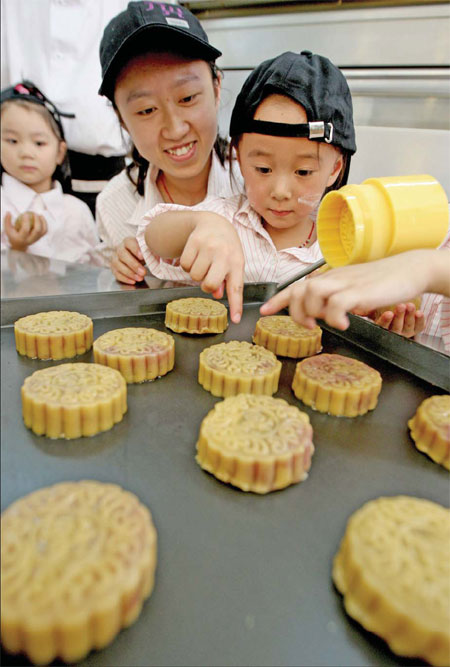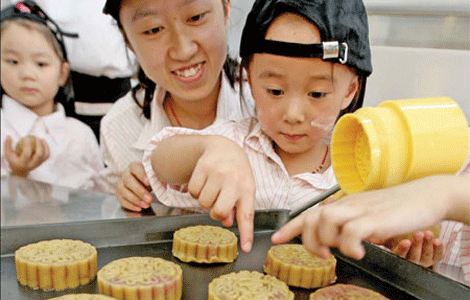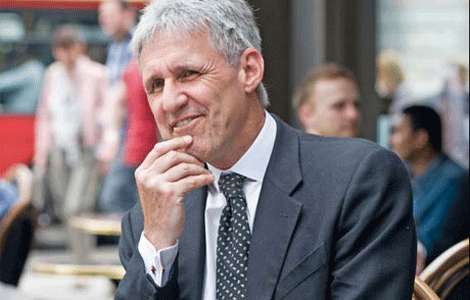Way over the moon
Updated: 2011-09-09 14:26
By Zhang Xi (China Daily European Weekly)

Standard mooncakes cost 4 yuan each but special box-sets can cost more than 1,000 yuan. [Lu Jian / for China Daily] |
High inflation rockets mooncake prices out of orbit for mid-autumn festival
After an outcry several years ago about wasteful packaging, it seems that the mooncake makers of China have seen the light.
Mooncakes are synonymous with China's Mid-Autumn Festival celebration, and in the past 10 years or so the way they have been presented for sale has become more and more ostentatious.
This year the Mid-Autumn Festival falls on Sept 12, the 15th day of the eighth lunar month, and pastry makers and shops are gearing up to cope with booming business.
While those who wish to enjoy the pastry moon-shaped cakes with an aromatic filling with their families opt for simple mooncake packs, others will send intricately designed luxurious gift packages, often to business partners or supervisors.
The festival, based on a tragic legend (see breakout story), was traditionally a day when people worshiped the moon with mooncakes to appreciate a united family or pray for family members apart.
The underlying themes of unity and peace are still there today, but they are heavily overladen with lashings of commerce as business people try to cash in on the big occasion.
In the past 10 years many big shopping outlets have had on sale magnificently packaged mooncakes filled with abalone or shark fin, costing 1,000 yuan (108 euros). The cakes, four or six to a box, often come with a bottle of red wine.
But that seems to have changed.
"We have hardly sold any expensive mooncakes over the past two years," says a saleswoman at a branch of the Carrefour supermarket chain, in the Haidian district in Beijing. The price of most boxes is now less than 600 yuan, she adds.
In 2005 and 2009, the government introduced regulations on mooncake packaging, which, to a large extent, has standardized the offerings.
"Since 2009, mooncakes packaged with luxurious wine or other gifts have become rare in the market," says Zhu Nianlin, president of the China Bakery and Confectionery Association.
But consumers are beginning to feel the pinch when they buy the cheaper boxes of mooncakes, usually costing between 100 yuan and 200 yuan.
"I buy (mooncakes) for my family every year and have found that they are a little more expensive this year," says Zang Na, 20.
Zhu acknowledges prices are rising, and puts it down to "the roaring prices of raw materials".
"This year prices of flour and oil have risen about 10 percent, and sugar has risen 20 per cent. These costs raise manufacturers' overheads for mooncakes 20-30 percent, so the average price of bakery products has risen 5-10 percent."
According to association data, in 2007 the production cost of mooncakes rose 12 percent from the previous year, and their sale price in most places in China rose 7 percent.
In the following three years the price of mooncakes rose between 5 percent and 10 percent a year.
However, Daoxiangcun, a 200-year-old pastry making company in Beijing that sells the festive delight by the convoy load every year, says prices are under control.
"Although the cost of our products has risen again this year, the overall price increase of our products is less than 9 percent," a spokeswoman for the factory says.
"As with last year, 80 percent of the mooncakes are priced at less than 200 yuan, the lowest being 56 yuan and the highest about 380 yuan."
The company will produce 2,600 tons of mooncakes this year, 13 percent more than last year, she says.
E-paper

Way over the moon
After an outcry several years ago about wasteful packaging, it seems that the mooncake makers of China have seen the light.
From death matches to child's play
Tomb raiders remain a menace
Kicking for joy
Specials

Salary bonanza for bosses
Top boss gets 8.78 million euros a year, far more than the State enterprise CEO with highest pay

Kicking for joy
Swedish college student represents China in Taekwondo championships

Long-term view of history
Pace of technological change will make mockery of differences between East and West, says historian
